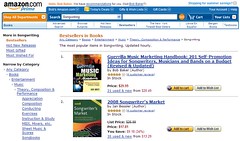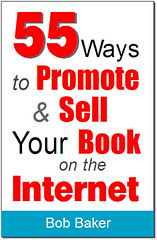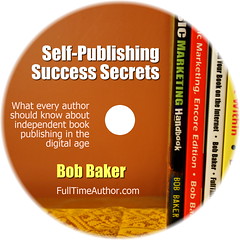Bob Baker's Book Promotion Blog
The TGIF Word Play Challenge
Bob wants you to give him another meaning for TGIF. Like "Thirsty Goldfish Ingest Fervently." Your turn!

I received a LOT of creative and funny responses left as Facebook wall comments and Twitter replies. Here are some of the better ones (with a social networking lesson at the end):
Those Gams Invite Fondling
David
Today Gratitude Is Foremost
Margaret
Tempting Girlfriends Incite Foolishness
Deepak
The Gnome Is Frolicking
Cheri
Tomorrow Gets Interesting, Frodo
Kathy
Try Getting It Fried
Lisa
True Greatness Inspires Frivolity
David
Try Guinness, It's Fab
Though Guinness Increases Farting
John
Twitter Goes Idio-Fanatical
Arnold
That Guy Is F**ked
Macdara
Tweeple Gather Interesting Friends
Rocky
Time Grows Increasingly Fractal
David
This Genius Is Frisky
Matt
Why am I sharing this with you? Two reasons.
First, these responses are amusing. And if you want to add one of your own, I encourage you to leave one in the comments below.
Second, this is a good example of how to use social networking beyond pure self-promotion. Yes, I plug my books and other things on Facebook, Twitter, MySpace, etc. But I balance those promotional messages with conversations.
You should do the same thing.
Many people go too far one way or the other. No, I don't need to know every move you make on Twitter. But sharing some snippets of your personal life is fine, especially if it engages people and stirs some discussion.
Some "social networkers" do nothing but post sales messages. I don't know about you, but after a while I start tuning these people out and unsubscribe from their feeds.
Check out how John Mayer and Ryan Seacrest (and even MC Hammer) use Twitter to communicate. It's a mix of personal and promotional. And it works!
So, start using these sites to plug your new books, live events, and media coverage -- while also asking questions, replying to other people's comments, linking to amazing sites and blog posts, sharing funny thoughts, etc.
Got it?
Great. Thank God It's Friday!
-Bob
 NEW!
NEW!How to promote and sell your book on the world's largest online bookseller
 Get more tips and inspiration when you subscribe to my free "Full-Time Author" ezine. I'll even send you a free download of my Self-Publishing Confidential report. Learn more about the free subscription here.
Get more tips and inspiration when you subscribe to my free "Full-Time Author" ezine. I'll even send you a free download of my Self-Publishing Confidential report. Learn more about the free subscription here.Your email address will not be shared. Unsubscribe at any time.
Connect with Bob on Google+
How to Promote Books with Your Mailing List
Here's an excerpt from my new book, "55 Ways to Promote & Sell Your Book on the Internet."
#9 - Communicate with Your Readers Regularly
 Okay, so you've got a mailing list up and running, and new people are signing up all the time. Congratulations! But you're only halfway done. The second part of the mailing list equation is using it. Yes, you have to communicate with these people!
Okay, so you've got a mailing list up and running, and new people are signing up all the time. Congratulations! But you're only halfway done. The second part of the mailing list equation is using it. Yes, you have to communicate with these people!Ideally, you should send something to your list on a regular schedule: once a week, every other week, once a month. I recommend you send something at least monthly -- and more often if you can.
- Author Marcia Yudkin delivers a weekly "Marketing Minute" email.
- Mary Lou Andre emails a wardrobe "Tip of the Month."
- Joe Vitale sends out email messages just about every day (which is probably a bit much for most authors).
So find a frequency that works for you, and don't go long stretches where subscribers don't hear from you at all.
Key: Also, don't let the terms "email newsletter" or "ezine" intimidate you. Email messages to your list don't have to be long. In fact, it's much better if they're short and to the point.
People will be more likely to open your emails if they know it won't take a lot of their time. Your messages will also be more warmly received if you deliver some nugget of value along with any sales pitch.
Don't have anything new to say? Sure you do.
Point your subscribers to a new article you've posted online. Make them aware of your media appearances and live events. Share a personal experience that inspired you.
More ideas: Hold a contest or offer a discount. Ask for input on the next book you're writing. Make them aware of helpful web sites and resources you've found that they should know about.
In short, think about the needs of your subscribers and ask yourself, "What's the most helpful thing I can deliver to my readers in a timely manner?"
Then deliver it.
-Bob
P.S. Again, this is a quick preview of my new book, "55 Ways to Promote and Sell Your Book on the Internet," due out in spring 2009.
 Get more tips and inspiration when you subscribe to my free "Full-Time Author" ezine. I'll even send you a free download of my Self-Publishing Confidential report. Learn more about the free subscription here.
Get more tips and inspiration when you subscribe to my free "Full-Time Author" ezine. I'll even send you a free download of my Self-Publishing Confidential report. Learn more about the free subscription here.Your email address will not be shared. Unsubscribe at any time.
Connect with Bob on Google+
The Facebook Terms of Use Uproar
It's been the talk of the social web in recent weeks. If you haven't heard, Facebook recently updated its Terms of Use. Many bloggers who paid attention to the details were outraged. One of the more popular posts on the topic (Facebook's New Terms Of Service: "We Can Do Anything We Want With Your Content. Forever") has been viewed more than 550,000 times.

But just today, Facebook CEO Mark Zuckerberg posted the following message, which demonstrates a smart move for the growing company -- and the power of citizen voices in corporate policy:
A couple of weeks ago, we revised our terms of use hoping to clarify some parts for our users. Over the past couple of days, we received a lot of questions and comments about the changes and what they mean for people and their information. Based on this feedback, we have decided to return to our previous terms of use while we resolve the issues that people have raised.
Many of us at Facebook spent most of today discussing how best to move forward. One approach would have been to quickly amend the new terms with new language to clarify our positions further. Another approach was simply to revert to our old terms while we begin working on our next version. As we thought through this, we reached out to respected organizations to get their input.
Going forward, we've decided to take a new approach towards developing our terms. We concluded that returning to our previous terms was the right thing for now. As I said yesterday, we think that a lot of the language in our terms is overly formal and protective so we don't plan to leave it there for long.
More than 175 million people use Facebook. If it were a country, it would be the sixth most populated country in the world. Our terms aren't just a document that protect our rights; it's the governing document for how the service is used by everyone across the world. Given its importance, we need to make sure the terms reflect the principles and values of the people using the service.
Our next version will be a substantial revision from where we are now. It will reflect the principles I described yesterday around how people share and control their information, and it will be written clearly in language everyone can understand. Since this will be the governing document that we'll all live by, Facebook users will have a lot of input in crafting these terms.
You have my commitment that we'll do all of these things, but in order to do them right it will take a little bit of time. We expect to complete this in the next few weeks. In the meantime, we've changed the terms back to what existed before the February 4th change, which was what most people asked us for and was the recommendation of the outside experts we consulted.
If you'd like to get involved in crafting our new terms, you can start posting your questions, comments and requests in the group we've created -- Facebook Bill of Rights and Responsibilities. I'm looking forward to reading your input.
Congrats to Zuckerberg for his honesty and for responding to the people who have made Facebook the success it is. And a big Thank You to the bloggers and Facebook users who rattled the cages enough to get the attention of those in charge.
-Bob
 NEW!
NEW!How to promote and sell your book on the world's largest online bookseller
 Get more tips and inspiration when you subscribe to my free "Full-Time Author" ezine. I'll even send you a free download of my Self-Publishing Confidential report. Learn more about the free subscription here.
Get more tips and inspiration when you subscribe to my free "Full-Time Author" ezine. I'll even send you a free download of my Self-Publishing Confidential report. Learn more about the free subscription here.Your email address will not be shared. Unsubscribe at any time.
Connect with Bob on Google+
Author Elizabeth Gilbert on Creative Genius
Just watched this video last night and had to share it with you today. It was recorded this month at the TED conference, and the message applies directly to authors and our struggles with ideas, expectations, and more.
In this clip, Elizabeth Gilbert, author of the bestselling Eat, Pray, Love, muses on the impossible things we expect from artists and geniuses -- and shares the radical idea that, instead of the rare person "being" a genius, all of us "have" a genius. It's a funny, personal and moving talk.
-Bob

 Get more tips and inspiration when you subscribe to my free "Full-Time Author" ezine. I'll even send you a free download of my Self-Publishing Confidential report. Learn more about the free subscription here.
Get more tips and inspiration when you subscribe to my free "Full-Time Author" ezine. I'll even send you a free download of my Self-Publishing Confidential report. Learn more about the free subscription here.Your email address will not be shared. Unsubscribe at any time.
Connect with Bob on Google+
Internet Book Promotion Tip: Develop a Web Presence
Here's an excerpt from my new book, "55 Ways to Promote and Sell Your Book on the Internet," due out in spring 2009.
#2 - Develop a Web "Presence," Not Just a Web Site
When many novice promoters think of Internet marketing, they believe it's all about putting up a good web site and then driving traffic to it using banner ads or a Google AdWords campaign (more on these later).
Sure, that's one way to promote your books online. But it's one of the least effective, in my opinion.
Another line of faulty reasoning is thinking that online book promotion is about search engine optimization (SEO). If only you did well in search results, you're worries would be over. It's true that putting basic SEO principles into practice can be helpful. But it's still not the ultimate solution.
The best way to promote and sell your books online -- based on my many years of Internet experience -- is thinking outside your web site.
Make no mistake, you need an attractive and well-organized site (and I'll cover my top tips in that area soon). But to make a real impact as an author, you need much more than a good web site.
You Need a Web Presence!
But what do I mean by "presence"?
You have a strong presence online when a growing number of people who have an interest in your topic or genre keep finding you in the places where they spend time online.
Sure, doing well in Google searches for your ideal words and phrases is one important part of having an Internet presence. But there's so much more to it.
Having a Web presence also means having your articles and sample chapters appear on prominent sites that cater to your subject matter. It happens when your name keeps popping up on active discussion forums related to your topic.
You also expand your presence when people find you on Facebook, YouTube, MySpace, Twitter, and any number of other social networking sites. It grows when people who subscribe to your email newsletter forward your latest message to their friends.
You further establish your presence by starting your own blog, while also making comments on other people's blogs and podcasts -- and when you do text, audio and video interviews online.
In other words, you set yourself up for success by making sure you can be found in multiple places where your ideal reader, buyer and fan hangs out online.
That's what I mean by developing a Web presence. And that's exactly what this book will help you do.
-Bob
P.S. Again, this is a quick preview of my new book, "55 Ways to Promote and Sell Your Book on the Internet," due out in spring 2009.
 Get more tips and inspiration when you subscribe to my free "Full-Time Author" ezine. I'll even send you a free download of my Self-Publishing Confidential report. Learn more about the free subscription here.
Get more tips and inspiration when you subscribe to my free "Full-Time Author" ezine. I'll even send you a free download of my Self-Publishing Confidential report. Learn more about the free subscription here.Your email address will not be shared. Unsubscribe at any time.
Connect with Bob on Google+




